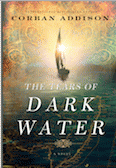Interview with Human Rights Activist and International Bestselling Author, Corban Addison
My guest today is Corban Addison, author of newly released The Tears of Dark Water. Welcome back to OpEdNews, Corban.
JB: Two years ago, we spoke about A Walk Across the Sun, which became a bestseller and dealt with human trafficking, abroad and here at home. This time, you again tackle a hot button issue. How did you come up with it?
CA: The Tears of Dark Water is about Somalia and the multi-dimensional fallout of the 20-year civil war on the Somali people and the rest of the world, including piracy, terrorism, child soldiers, and refugees. My literary agent gave me the idea for the story back in 2011 after the U.S.-flagged sailboat, the S.V. Quest, was hijacked by Somali pirates in the Indian Ocean and the U.S. Navy intervened, with tragic results. I wanted to write a book that would tackle the age-old problem of violence and its consequences for ordinary human beings, both those who perpetrate it and those who are victimized by it. I also wanted to write a story in which my characters would wrestle with the question of forgiveness in the face of irremediable wrong.
JB: You can rest assured that I found a lot of wrestling going on within those pages. I understand that you did a spectacular amount of research for this one, Corban. How did you go about it?
CA: As with all my books, I was very concerned to get the details right. So I learned how to sail and went sailing on the Chesapeake Bay and in the Seychelles. I landed on an aircraft carrier in the Arabian Sea and spent three days on the carrier and a guided-missile cruiser learning the ropes with the U.S. Navy. I visited refugee camps in Mogadishu, Somalia and northern Kenya under armed guard. I befriended Somalis in the U.S. and East Africa. I read the Quran from beginning to end (in English, of course). And I attended the federal trial of three Somali pirates in Virginia. I also interviewed dozens of experts across many fields and read a small truckload of books and papers on many aspects of the Somali civil war.
JB: Hold on a minute. You actually landed on an aircraft carrier? How cool! I have to ask: Did you write this book just so you could do that?
CA: Yeah, it was pretty cool, but, no, it was just part of the process. I knew that the first half of the book would happen at sea, a lot of it aboard a Navy ship. So I talked to some friends in the State Department and they helped me connect with the right people at the Navy to green light an embarkation within the Fifth Fleet. The Navy has a long history of inviting journalists to join them at sea. They want people who write about them to get the story right. I pitched them on the concept, and they said yes. I took a COD--Carrier Onboard Delivery--flight from Bahrain to the U.S.S. Truman in the Arabian Sea. I spent a night on the Truman, and then took a helicopter to the U.S.S. Gettysburg, a cruiser, and spent two nights there. We sailed through the Strait of Hormuz between Arabia and Iran. It was an amazing experience and gave me all the detail I needed to write my scenes at sea authentically.
JB: I know you did a lot of research for your last book but this one demanded even more of your time. How does a writer juggle all those research jaunts with his law practice and family life? Is your wife still talking to you after this one?
CA: You're right. This was the biggest research project I've ever undertaken. I could never have done it on top of a law practice. I've been writing full time since 2011. That said, the project was all consuming, and at many points I found myself giving my family short shrift. To some extent, that's the burden of being a writer. We get lost in our own worlds. My writer friends have the same problem. But my travels and research exacerbate it. My kids are young and very forgiving. My wife, however, bears the brunt of my absences. She's my hero. Without her tireless support, I could never do what I do.
JB: Speaking of which, your book is really about families, albeit in very different cultures: their relationships, what motivates them. It's what makes The Tears of Dark Water so touching. I'm assuming that wasn't an accident.
CA: No, it wasn't. While the novel was inspired by a piracy attack at sea, I wanted very much to avoid writing just another pirate book. I wanted to write a story about three families from different parts of the world who are drawn together by an international tragedy and who are forced in the aftermath to reckon with themselves, with the past, and with the perennial human questions of justice and forgiveness.
JB: That's a toughie, Corban. As a species, we're used to pigeonholing but, in a case like this, we have to suspend those knee-jerk reactions. The characters in your book aren't the only ones who have "to reckon with themselves". If we give this the attention it deserves, it forces us to step outside our comfort zone. That makes me curious as to what kind of reactions you've gotten so far?
CA: Good stories are a mirror that reveals the truth inside of us as much as they are a prism that casts the world in a new light. I've been very pleased with the responses I'm getting. A lot of people say it's my best book. That was my hope when I wrote it.
(Note: You can view every article as one long page if you sign up as an Advocate Member, or higher).







